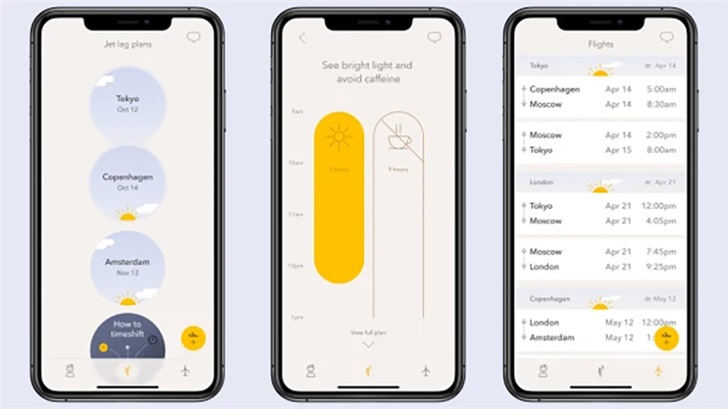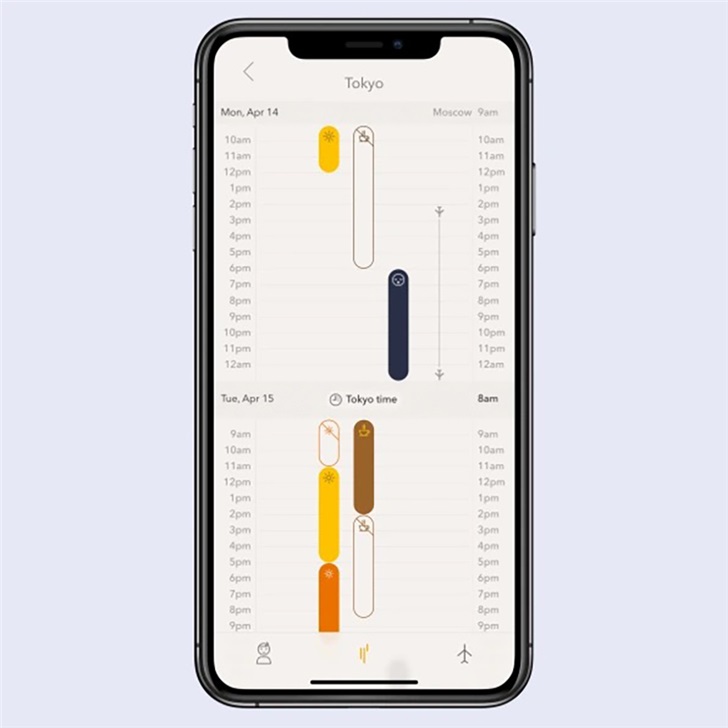Are you tired of being sleepy during your trip? A custom sleep schedule called timeshifter can adjust the internal clock of the human body, which may promote the development of tourism.
Like wearing a flying mask or dismantling a tuna sandwich, wearing sunglasses at the airport at night will attract the confused eyes of travelers. Do you think others think you're a celebrity trying to cover yourself up? In fact, most people may be thinking that for this strange person, they are celebrities.
In fact, this behavior is only following instructions. Timeshifter is a personalized TDOA app that has been tested by NASA astronauts. It requires me to avoid strong light before getting on the plane. In the Shanghai airport full of fluorescent lights and screens, this is not an easy thing. It would be better for me to completely cover my eyes or dim the light of the airport, but this is unreasonable unless the tourism industry can adjust to become a time regulator.
Dr. Steve lockley, a neuroscientist at Harvard Medical School and an associate professor of medicine, said: "our plan is practical and provides advice that you can implement in reality." For ten years, the famous circadian rhythm expert has been customizing the time difference plan for Formula One racers and astronauts. After efforts, he and a former NASA consultant jointly developed the timeshifter application.
"When the system advises you to avoid the light, it doesn't mean to be completely in the dark or close your eyes, just reduce the intensity of the light. And the system won't advise you to sleep at 7 p.m. because you basically don't do that, so such advice is meaningless," Dr. lockley said
Personalized application
Timeshifter is a very easy-to-use application. Users only need to input complete flight information, living habits (going to bed early and getting up early or night owl) and sleep mode. Sleep mode includes users' favorite sleep, wake-up time, melatonin, coffee and other ways to adjust sleep.
After that, the timeshifter will immediately generate a personalized sleep schedule. During the implementation of the plan, the following contents will be pushed: avoid caffeine in the next 6 hours, keep yourself exposed for at least 30 minutes, take melatonin, etc. The user can execute the plan three days before the flight or before the aircraft takes off, but the content of the plan will be different. The fee for this service is $10 per service or $24.99 per year.
The application is unique in that it is completely based on sleep neurology and is designed to advance the user's internal clock. Mickey Beyer Clausen, co-founder and CEO of timeshifter, explained that the way to beat jet lag is to transfer a person's biological clock cycle to the new time zone as soon as possible, but this is not 100% applicable. Therefore, timeshifter may have hundreds of different plans for the same trip, depending on the way users sleep and when they start using the application.
Based on this situation, Danish entrepreneur Beyer Clausen said when launching the app in 2017: "this is not something users can learn, so users need to customize personalized plans every time they travel."

This app needs to accurately control two factors, namely time and light. Beyer Clausen believes that this is the problem of the sleep industry. Most companies only propose solutions for symptoms such as drowsiness, rather than solving the fundamental problem of brain circadian rhythm dislocation.
Beyer Clausen told me: "the biological clock is the result of human evolution. The earth orbits the earth every 24 hours for millions of years. This will not change." Biological adaptation to the new environment is very slow. When tourists drive or travel by boat, the circadian rhythm will naturally occur, while adapting to the new time zone will be slower. Therefore, when the plane brings you quickly into the new time zone, it will disrupt the internal biological clock. Recent studies have proved that the human body can adapt to the new time zone by customizing the light / dark cycle, so as to weaken the time difference.
Beyer Clausen explained: "light is a very powerful foundation. If you set the lighting time and use melatonin, it will help you adapt to the new time zone faster. But you have to take melatonin at the right time, and people often make mistakes on this point."
Several existing apps, such as jet lag rooster, do not consider the personalized customization of circadian rhythm. Other apps, such as uplift, use timed massage to prevent jet lag.

At present, timeshifter is welcomed by business travelers and athletes who are willing to adjust during the journey. It's about productivity: in 2017, a 20-year survey of 40000 major league baseball games showed that if a team competed across two or three time zones without adjusting their sleep time, their average performance would be worse.
Beyer Clausen points out that continuous travel may expose people to more risks. Jet lag not only deprives travelers of valuable time to reunite with their families, but also may affect their health. Studies have shown that jet lag can make people face the same health risks as shift workers, such as diabetes, stroke and certain cancers. Extremely tired travelers are also more likely to fall asleep in taxis, with 21% of fatal accidents due to fatigue driving.
"When sleep is associated with personal performance and safety, results are more important for individuals, companies and health," Beyer Clausen said
Is this an industry good for circadian rhythm?
Although timeshifter's plan is based on the latest sleep science, implementing some recommendations can be challenging for some people. At the global summit held in Singapore in October, participants received free membership, in stark contrast to the plans of participants on the same flight. Nearly 20 people said that if they strictly implement their own plans, they will achieve good results; Another quarter said the plan was a little difficult; Of course, some people also reflected that the app guided them to stay up for several hours late at night.
I myself gave up the plan in the midnight flight because it required me to stay up five hours late. It was too difficult after the plane turned off the lights.
To this end, timeshifter recommends absorbing blue light by looking at mobile phones or laptops, but this is more difficult for those who habitually take sleeping pills on the road.
Dr. Michael J. Breus, a researcher at the American Academy of sleep medical sciences and a clinical psychologist in the Department of sleep disorders, said: "for those who are often troubled by jet lag, timeshifter will attract them, but the app needs to be restrictive, otherwise it will disappoint consumers."
Breus, an investor in timeshifter, also said: "frankly, this is a learning curve. Many people will find it very troublesome. They may think they only need four cocktails."
Timeshifter tries to help users comply with the plan. The app has a real-time customer service program. Users can easily get relevant suggestions, but users in flight are not easy to get help.
Of course, the more time users spend adapting to jet lag, the more they can understand the key points and experience. For example, if the app prompts the user to sleep for 6 hours, but the user can't sleep, it will advise the user to use a sleep mask to close their eyes. This is because during sleep, it is more important to avoid light than sleep.
At present, timeshifter has not been fully integrated into the tourism industry. People are often influenced by airlines, which are more concerned with putting passengers to bed than avoiding jet lag. Even in first class, they can't really experience personalized plans. Improper meal schedule and dim lights are only a small part of the problems bothering passengers.
"The focus of the service should be to switch your biological clock to the new time zone as soon as possible so that you can sleep naturally, wake naturally and be energetic," Beyer Clausen said
Now some travel brands have tried circadian rhythm. Timeshifter cooperates with Liushan group to provide free members for guests, and the cooperation with other hotels is about to begin. In addition, the start-up also cooperates with United Airlines and is communicating with more than a dozen other airlines. The company hopes to provide free services for passengers.
More and more hotel brands hope to improve the travel experience through personalized services. Timeshifter may only be the beginning of the outbreak of more circadian rhythm products. Breus believes that once Airlines start providing timeshifters to customers, they will need to solve some new problems: how to help passengers comply with the plan? How to improve the passenger experience?
He predicted that "the first person to eat crabs will be in the leading position."
The most important task of timeshifter is to convey to people the importance of regulating sleep and arousal cycles, so as to help people sleep healthily. Although the startup hasn't released sleep products yet, the company will pay close attention to jet lag and teach people to set a stable and consistent sleep schedule.
In the past few years, Beyer Clausen has found that sleep health problems have gradually entered the public topic, so he is very optimistic about the development of products. Now there are countless tools, apps, monitoring devices, lovely sleep robots and houses to optimize sleep, which can help people form better sleep habits.
"Everything is moving in the right direction," Beyer Clausen said. "People know more about sleep health than they did five years ago. Nevertheless, when timeshifter acted as a disciplinary committee, there are still some people who are sleepy and complain about why they can't sleep at a specific time and wake up five hours later. Of course, it's because it's bad for him. We're developing user habits step by step."